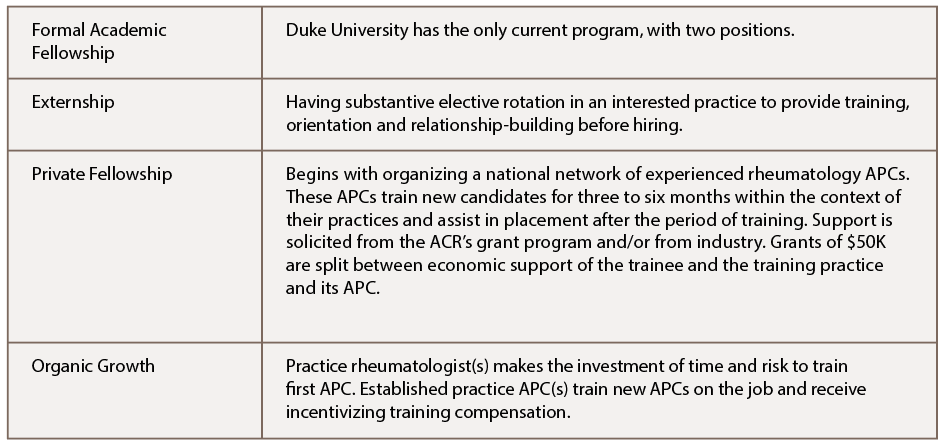Didactic and clinical training in rheumatology occupies little space in the typical academic years for APCs. In contrast to multiple other medical, surgical and psychiatric disciplines in which 12-month fellowships are available to APCs, only Duke University offers a program for NP fellows in rheumatology. The fellowship, started in 2017, offers a place to two NP fellows. A successful PA fellowship in rheumatology at the Dallas Veteran’s Administration Medical Center ended when its four-year grant lapsed in 2008.7 Ultimately, most training of APCs in rheumatology is on the job and lacks uniformity.
Symposium Setup
Results of an administrative study at AARA that underscored the challenges of reaching competency and confidence in this complex specialty were discussed at the symposium. Views from this study on how APCs learn in didactic sessions and experience from the RNS guided the Phoenix Rheumatology Association to challenge both physician and APC lecturers to provide disease-oriented, highly functional lectures limited to 30 minutes followed by 15 minutes of panel Q&A.
The clinical lectures covered rheumatoid arthritis, systemic lupus erythematosus, psoriatic arthritis, spondyloarthropathies, crystalline arthropathy, osteoarthritis and joint hypermobility, myositis, vasculitis, scleroderma, osteoporosis, fibromyalgia and the central sensitization syndrome.
An interactive lunch presentation placed participant APCs in the role of consultant in breaking down barriers for the rheumatologist contemplating the hiring, training and career development of an APC for the first time.
How would experienced APCs erode physician barriers that may center on trepidation about recruitment, on-the-job training and delegation, and financial risks?
Breaking Down the Barriers
Views and experiences on seeking new graduates diverged. Betsy Kirchner, NP, Cleveland Clinic, indicated that institution’s experience with new grads “has not been about the lack of experience; it is a sort of educational burnout. Rheumatology is about going home and reading a few chapters. … If the person who is being interviewed doesn’t seem to give you that sense that they would do that, then it is probably not going to work out,” she said.
Katherine Clark, PA-C, said, “When thinking of hiring an APC, precept a student from a PA school or an NP school … for six to eight weeks if you can. That way you get to know them and whether you fit well together, and they get to learn your practice. You are not paying them while you are training them. They then know how you practice and are able to begin working as your APC pretty smoothly that way.”




